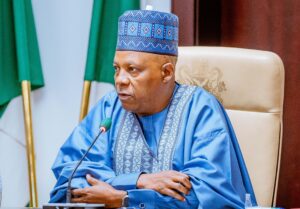
FG purse to suffer as manufacturers’ tax set to dwindle — MAN
By Omolola Dede Adeyanju
The absence of stable, effective and fairly priced electricity supply in Nigeria has been a long-standing challenge for manufacturers.
The worrisome development has compelled many manufacturing industries to supplement the unreliable electricity supply with alternative energy sources. Regrettably, the available alternative energy sources such as diesel have become exorbitantly expensive.
On average, surveyed data by MAN suggests that manufacturers spent at least N144.5billion on sourcing alternative energy in 2022, up from N77.22billion in 2021.
This translates to about 87 per cent increase in the cost of access to alternative energy sources by manufacturers within a year. In the last eight years, electricity tariff has been increased by 186 per cent.
The Manufacturers Association of Nigeria (MAN) in a statement signed by its Director General, Segun Ajayi-Kadiri mni, expressed, “The fact that Government itself is owing N75billion in unpaid electricity bill is indicative of how burdensome the cost of electricity has become.
“Therefore, it is highly concerning for manufacturers to witness the electricity tariff skyrocketing beyond the present embattling high prices, starting July 1. A 40 per cent hike at this time is simply outrageous.
“As a matter of fact, a further rise in electricity tariff could lead to the following “Costs of production will soar: Higher electricity tariff will directly increase the cost of production for manufacturers.
“Already, we have energy constituting between 28-40 per cent in the cost structure of manufacturing industries. You can imagine the impact on manufacturing industries that are energy-intensive such as metal processing, heavy machinery, and chemicals manufacturing; Profit margins will reduce: A spike in the electricity tariff will erode the profit margin of the manufacturers and reduce their ability to expand operations and create new jobs.”
High probability of activities paralysis: This is a definite possibility among small and medium-sized enterprises (SMEs) who are unable to accommodate the higher price.
Further implications are; “Potential decrease in the revenue collectable by government: The hike in electricity tariff will reduce the manufacturers’ profitability and by extension the quantum of taxes and fees payable to the three tiers of Government. Manufacturers remain the largest income taxpayer in the country.
“Therefore, in the event of poor income generation due to high costs of production, the government purse will suffer; Manufacturers will ultimately pass on the additional cost to the consumers of their products: This will increase the cost of local made products in the market and complicate the rising inflation rate in the country.”
Also, “Recession of manufacturing activities: An increase in electricity tariff will reduce the purchasing capability. One of the resulting effects is the fall in demand and recession of manufacturing activities over time; The sector’s competitiveness will definitely worsen: The high cost of the products will make locally produced items less competitive, when compared with imported alternatives.
This is also true of exports, as Nigeria products may find it more difficult to penetrate foreign markets. Such a move will restrict our exports earnings because it will be impossible to compete with counterparts in the global trading environment.”
In addition, “High probability of outward investment: Some manufacturing industries may consider shifting production to other economies with lower electricity tariffs and guaranteed availability.
“The expectation of the manufacturers is that the Federal Government and NERC will ensure improvement in electricity generation, transmission and distribution that will lead to adequate and reliable electricity supply in the country, rather than increasing the tariff on the mere 4000MW to meet all revenue needs of stakeholders in the electricity supply industry. Government should ensure that at least 90 per cent of electricity consumers are metered to ensure consumption reflective electricity bill payment, formulate electricity policies that will aid investment in energy industry to increase generation capacities that will usher in large scale production of electricity and ensure effective implementation of the recent Electricity Act (2023) that is aimed at increasing the electricity supply in the country.
“Specifically, there is an urgent need for the diversification of energy sources and intensifying infrastructure investment in the power sector; Eradicate outrageous bills by closing the metering gap through the liberalization of ultimate users’ access to effective mass metering; Ensure the connection of all consumers to the electricity grid to avoid free riding and unfair charges on the few connected consumers; Also, work on efforts to increase the electricity supply base in order to distribute the total cost among a high number of consumers at a much lower unit cost; States and private investors should rise up to the challenge by taking advantage of the Electricity Act 2023 to eradicate the energy poverty of their people.”
The DG concluded by stating, “As it is today, the manufacturing sector, which is the engine of growth, is still struggling as a result of inclement production environment in Nigeria. The expectation is that Government will engage in extensive and intensive consultations with the manufacturers; focus on measures that will salvage the sector and halt the trend of shutdown of factories, knowing the implications and the multiplier effects on employment and the economy. Care should be taken to avoid introducing burdensome measures that will further strangulate the manufacturing sector and the whole economy.”



